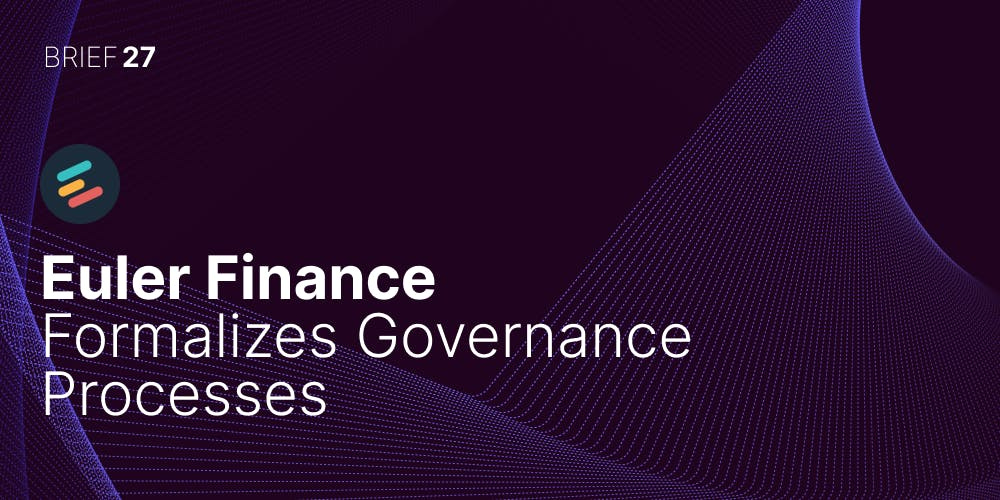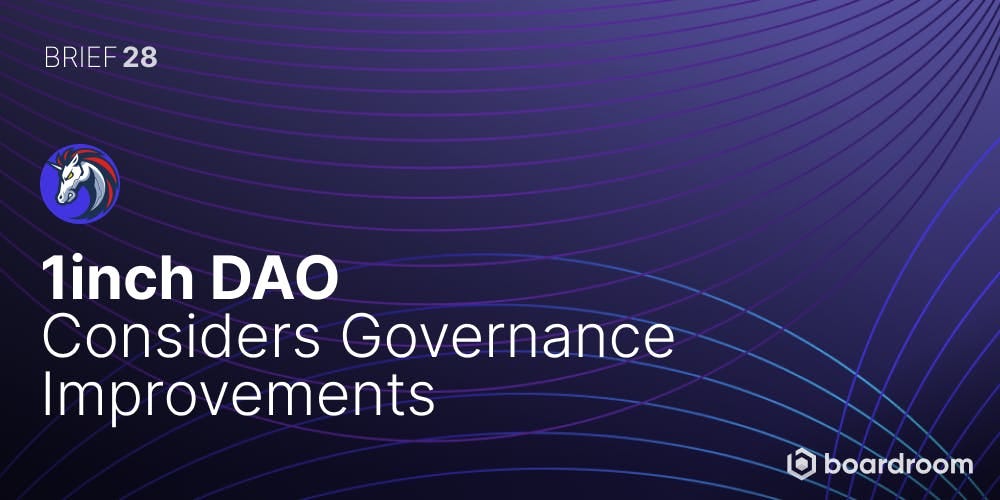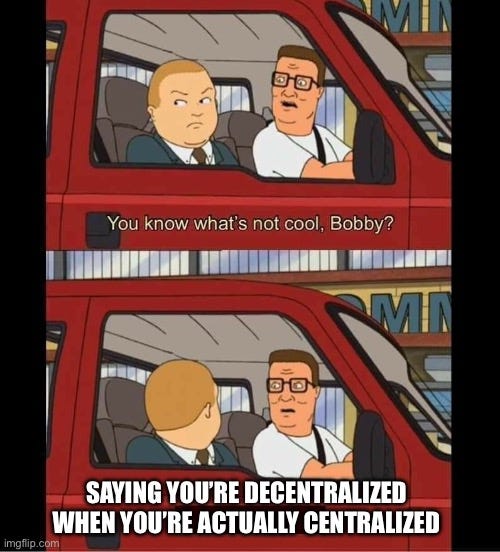🗳 This Week in Governance - Feb 2
A weekly resource covering crypto governance, politics, and power.
📣 Key Points
Uniswap debates bridging solutions
ENS DAO funds name-buying
Cosmos Hub considers its first grant program
… and much more
Voting Activity (L7)
🗳️ 49,946 ballots
👥 20,074 voters
📜 239 proposals
🌐 70 active DAOs
Let’s get into it 🔥
🗞 News Brief
Uniswap debates cross-chain bridge solutions for BNB deployment
In late December of 2022, Ilia of 0xPlasma Labs proposed that Uniswap v3 be deployed on Binance’s BNB Chain, “the second-largest blockchain infrastructure by volume and user base.” Ilia listed 17 reasons in support of the move, which received broad support in the Uniswap forums. A temp-check for the deployment recently passed with Celer as the selected bridge provider for cross-chain governance. But the discussion concerning bridges — which can be a major vulnerability — continued in the forums. Representatives from other bridge protocols, such as deBridge, LayerZero, and Wormhole, joined the conversation. Since Uniswap’s Business License expires in early April — after which others can freely fork Uniswap — pressure to make the decision and implement the BNB deployment is high.
The Uniswap Foundation’s Devin Walsh commented to say that a new temp-check had been posted to Snapshot for the community to select among four bridge providers. This was described as an exception, and a full description of future cross-chain bridge assessments was presented for feedback the following day. Celer posted a “sub-proposal” making the case for a “vendor-lock-in-free Universal Governance Mechanism (UGM) for Uniswap that utilizes multiple cross-chain protocols simultaneously.” This approach was generally supported by deBridge as well as several other prominent voices, some of whom believe the process to have been rushed and not comprehensive. The temp-check went forward and Wormhole received the most support, although some large token holders either could not participate or chose to abstain. An on-chain proposal will be forthcoming. Stay tuned and subscribe for a full brief on new developments.
ENS Fairy and “Bypassing Premium Expiry”
When ENS names expire they enter into a 21-day period in which a premium must be paid by any new registrant — and the premium goes to the ENS DAO. The DAO has set up ENS Fairy to purchase names during this premium period, with the intent of increasing ENS adoption through the buying (and gifting) of celebrity and brand names. Nick.eth believes “the point of ENS was always to get names into the hands of people who will use them, over those who will speculate with them or attempt to resell them at a profit. This is particularly true when it comes to names with one natural owner” — supporting the initial purpose of setting up the ENS Fairy. The funds used both come from and revert to the DAO — a feature that DAO member sat believes is problematic because it allows the DAO to effectively “bypass the premium fee” and so work against “the fair distribution of expired names.” But it could also potentially allow the ENS Fairy to “remove names that are unsavory from circulation when in expiry” — and raises the question of who decides which names are to be removed, potentially setting up a “policing” mechanism. The ENS Fairy is currently overseen by the ENS Ecosystem Working Group, which has 50k USDC allocated to ENS Fairy in its latest funding request. There is debate on the forum and commentary on CT, with some calling for further conversation.
Cosmos Hub Considers Grant Program
On January 12, Youssef Amrani posted in the Cosmos forum to propose the creation of a grants program to support “the funding of small to medium size projects that aim to improve Cosmos Hub’s core technology, products and ecosystem.” Funding would be made possible by the recent increase in the Cosmos community pool tax, which is projected to yield an additional several million ATOM per year. The proposal outlines a reviewer committee of seven people, a program coordinator, and an oversight committee of three people, almost all of whom are identified. Salaries are specified, and the nine-month grants budget is broken down: $5.2M in grants would be allocated, ranging from $10k-$1M per grant.
While there was general positive support expressed for the idea of a Hub-specific grants program, concerns were immediately raised about self-appointments to the committees as well as the centralizing decision-making with regard to grants — which otherwise are put directly before the community. Further, there was pushback on the idea of one “canonical grant program,” which the proposing team immediately addressed by changing their name to ATOM Accelerator DAO and making clear their intentions. Compensation for team members was also an issue. The team made a number of changes to the proposal, including reducing compensation by 10% and creating a vesting period for received ATOM. The initial post received 127 comments and replies; voting is live now.
📚 Good Reads
Hybrid Ownership, by Caleb of Variant
Consensus Canon, by Andrew Lewis-Pye of a16z
Overview on DAO Governance, by the DAO Research Collective
Analyzing Reputation Networks to Improve DAO Governance (Part 1), by Saulthorin
Zero Knowledge Proofs and DAOs: How to Build a Private Organization, by Samantha Marin
Not Companies, Not DAOs But a Third More Secret Thing, by Leighton
Principal-agent Problems in DAOs, by Kevin Owocki
Vertical Communities, by Noah Smith
Regulate Web3 Apps, Not Protocols Part III: The Web3 DAO Dilemma, by Miles Jennings
Disambiguating Autonomy, from BlockScience
Forums:
Maker: How to become an anon
ShapeShift: DAO what?
🧵 Threads
Which countries are advancing or at least exploring DAO regulation? by Daniel Ospina
Why do I even bother? What am I even doing here? by @shawnlgrubb
🎧 Listens
Heterarchy: A Structure for DAOs, with Yancey Strickler on Building at the Edges
The Token Episode, pt 2 on DAO Talk
Overthrowing the Network State, by The Blockchain Socialist
NBA Owners’ Feedback on Krause House’s Pitch, from Krause House DAO
📡 Coverage
Euler Finance Formalizes Governance Processes
TLDR: Euler’s DAO seeks to provide more clarity and structure to its developing governance systems.
1inch DAO Considers Governance Improvements
TLDR: The 1inch DAO voted to reduce the length of its (pre-implementation) governance process from a minimum of 12 days to a minimum of 8 days.
📜 Proposals
An Operative Definition of Privacy, an addendum to [SCP-80]
This proposal seeks to build community consensus around the DAO’s definition of privacy. A proposal passed in the summer of 2022 made the case for “data analytics to inform our path to product market fit,” and soon after data began to be tracked for users who have opted in while using the ShapeShift app. The proposer believes it is important to define the parameters of these data, and also sees the need to define privacy in this context. The proposed definition is as follows:
“’Data privacy’ means the ability of a user to determine when, how, and to what extent their personal information is shared with others as well as how that data is correlated with other trackable/metricisable [sic] events inside and outside the application.”
✅ Voting is shielded
⏰ Voting ends: Feb 8th
⚡ Type: Snapshot Vote
💬 Read the discussion
✍ Author: TylerShapeShift
Set duration period for DAO Committee members
This poll before the Decentraland DAO asks the community to consider a twelve-month term limit for members of the DAO Committee. As it stands, Committee members serve indefinitely, which can, the proposer argues, lead to a lack of accountability, fresh perspectives, and trust — and could eventually create a reduction in democratic participation as the community comes to rely on the “institutional knowledge” embodied by the DAO Committee. As the proposal states, “it is important to balance the need for stability and consistency with the need for accountability, fresh perspectives, and democratic participation.”
✅ 94.56% voting “No”
⏰ Voting ends: Feb 4th
⚡ Type: Snapshot Vote
💬 Read the discussion
✍ Author: Decentraland
Restructure Governance Process - Disband Governance Council
The stated motivation of this Balancer proposal is twofold: to increase decentralization, and to “create more separation of concern between the governance decision-making process and the risk-aware implementation of decided proposals.” In particular, the proposer argues that Balancer governance has evolved to the point that the functions that the Governance Council provides are no longer needed. More than this, the proposal lays out a clarified and further refined governance process from beginning to end.
✅ 100% voted “Yes, let’s do it”
⏰ Voting ended on: Jan 30th
⚡ Type: Snapshot Vote
💬 Read the discussion
✍ Author: Tritium
💭 Ecosystem Takes

🎈 Have a Meme
📮 Stay Up to Date
Follow us: Twitter | Discord
Subscribe to: Newsletter | Mirror | Apple | Spotify
📣 Boardroom API access update 📣 - get your key!
The Boardroom API will be enforced starting this week.
If you do not already have a key use this form to request one here. Once you have submitted we will email you shortly with a key. You can always reach out on discord with any questions or concerns.














